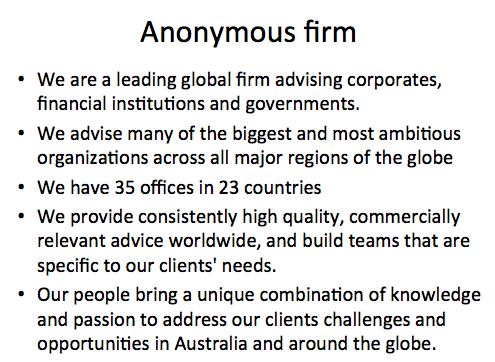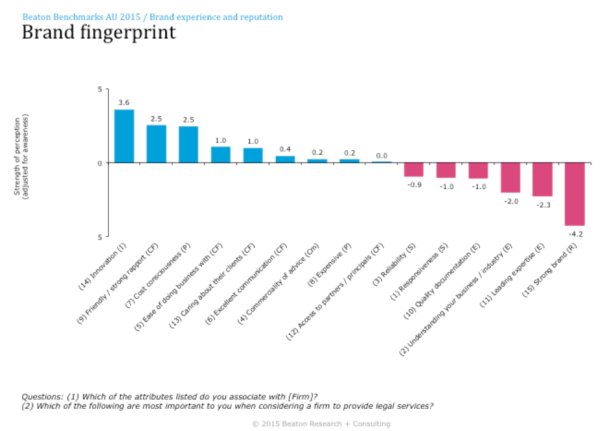Professional services are the final frontier for branding.
The period since the millennium has seen the rise of business development and client relationship management to drive competitive growth. The next era will see brand differentiation as the new battlefront in professional services for clients and talent. And the advantage will go to the first movers.
The current situation is reminiscent of the story of the emperor’s new clothes.
There is a great deal of talk about brand, however, there is little knowledge or expertise regarding the true meaning of ‘brand’ and ‘branding’ in a service industry, let alone how to translate these concepts into a professional services and B2B context.
What do you really stand for?
It is hard to find a CEO in professional services who doesn’t proudly talk about the importance of their brand and culture to differentiate their firm in an increasingly crowded, fragmented, and competitive market. Yet if you ask them to explain precisely what it is about their brand and culture that is differentiating, they will either struggle to answer or eloquently recite the same generic blah, blah that is on all their competitors’ websites.



Not only that, if you research the clients and people of many, although not all, firms (as we do at beaton) and scratch beneath the surface, you will find that the brand experience is inconsistent and doesn’t match the aspirational brand promise made in their external and internal marketing activities. In other words, what these firms say about themselves does not play out in the experience of their clients and people on a day-to-day basis.
Having said that, our research does provide valuable insights into the firm’s culture and positive brand truths that, if delivered consistently, would be differentiating.
Is your brand promise relevant? Does it engage your clients and people?
The second and more important question to ask the CEO is how relevant their brand promise is and how strongly it engages their clients and people.



Our brand benchmarking research shows that some firms are differentiated on desirable attributes e.g., being seen as ‘Innovative’, but are delivering a brand experience that negatively differentiates them on critical performance attributes e.g., ‘Understanding your business and industry’, ‘Responsiveness’, and ‘Reliability’.
Our research also shows that whilst an attribute like ‘Innovative’ is attractive to clients and staff, if a firm is highly innovative but can’t get the basics right then it requires greater effort by the clients and staff which creates dissatisfaction, and they will be inclined to go elsewhere.
The big international retailers and banks have stopped measuring customer delight and are measuring customer effort as the best indicator of repeat business (which by the way is more reliable than Net Promoter Score). The greater the effort required by the customer, the more likely the customer will switch to a competitor. If they can’t find what you want within two clicks online, or if the check-out time in-store is too long they won’t come back. And they will share their negative experience by word-of-mouth and, increasingly, on social media and rating sites.
The point here is not substituting ‘Innovation’ with ‘Responsiveness’, it is about delivering a positive experience on the client service basics whilst standing out as innovative.
Powerful brands are both strongly differentiated and relevant.
Brand Promise = Culture/Style + Reputation + Service
When most CEOs talk about brand they are really talking about visual identity, reputation, and footprint, e.g. in law groupings and monikers like global elite, magic circle in London, white shoe in the US, seven sisters in Canada, top-tier, mid-tier, boutique.
By definition being in one of these groups positions their firm as being like the others in their group. The same applies to ‘Big 4’ in accountancy, ‘MBB’ in strategy consulting…and so on.
The real differentiation comes through culture / style and service, and how the firm’s clients and people experience these largely emotional attributes.
Think about Qantas and Virgin, both are international airlines flying to the same destinations, in the same planes, with near-identical advanced booking systems, lounges, catering, pilots, ground staff, and cabin crew. However, each airline’s experience is branded through culture / style and service – as well as visual identity. In fact, frequent travellers could readily distinguish between a Qantas experience and a Virgin experience even if they were unbranded.
Brand or client experience = Total interactions across all touch points
Branded service businesses use their brand promise as an organising principle that drives everything they do internally and externally. This involves:
- Mapping all the touch points with clients and empowering their people to innovate and deliver an experience that brings the brand purpose to life.
- Designing their client and people environments to reflect their brand purpose.
- Recruiting, developing behaviours, measuring and rewarding their people in line with their cultural values.
- Matching the internal people experience with the external client experience e.g. Responsive and Reliable with each other internally.
- Communicating internally and externally with a branded language, tone and style.
This creates a highly differentiated brand experience which is enduring and because it is grounded in the firm’s culture can innovate and adapt to a changing market.
The battle has begun for brand dominance in professional services and the prize for the winners will be their unfair share of the best clients, work and talent.
Branded service businesses use their brand promise as an organising principle that drives everything they do internally and externally.
The corresponding post type is disabled. Please make sure to 1) install The7 Elements plugin under The7 > Plugins and 2) enable desired post types under The7 > My The7, in the Settings section.



